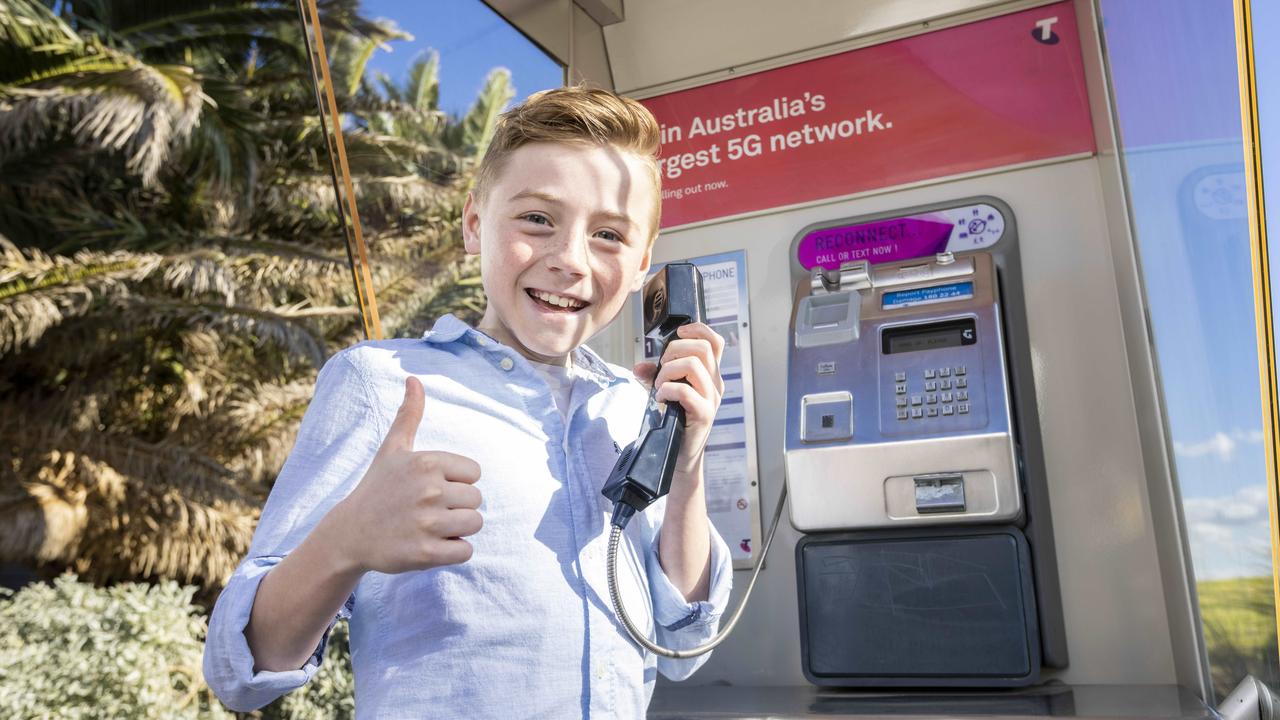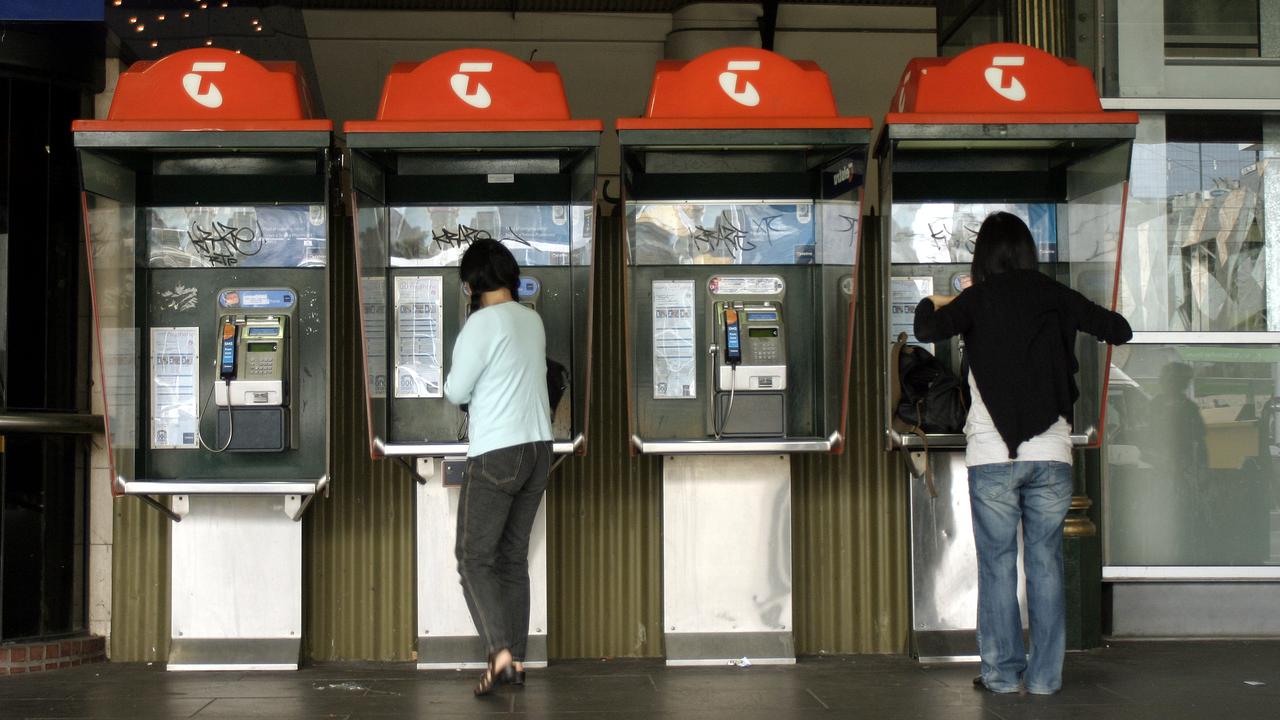Optus makes complaint against Telstra after it makes Australia’s 15,000 public payphones free
Optus has launched a complaint against Telstra after it offered free phone calls on Australia’s payphone network.
Technology
Don't miss out on the headlines from Technology. Followed categories will be added to My News.
Exclusive: A bitter battle is emerging over the real cost of free phone calls on Australia’s payphone network after Optus lodged a complaint about its rival’s decision to remove fees this week.
An executive from the country’s second biggest telco wrote to Communications Minister Paul Fletcher just days after Telstra’s announcement, demanding the company be stripped of taxpayer funding paid to maintain the network of more than 15,000 public phones.
In the complaint, Optus alleges Telstra is using the payphones “to its commercial advantage” and claims that “it costs more to provide the services than it generates” do not stack up if the company is able to offer phone calls free.
“Telstra’s actions in forgoing revenue for payphones is a clear demonstration that there are in fact broader commercial benefits in providing these services — a fact we have repeatedly highlighted,” the letter read.
“Given Telstra’s action, industry and taxpayer payments for payphones should cease. If this is not contractually possible then Telstra’s payphones should be rebranded as a ‘community asset paid for by the Federal Government and the telecommunications industry’.”
Telstra receives $40 million each year to maintain public payphones under its Universal Service Agreement contract.
Optus’ complaint comes after Telstra made the bold move to make local and national phone calls from public phones free, as well as calls to mobile phones.
Consumers will still have to pay to call overseas, however.
The move was largely welcomed by communications groups and charities, with the
Salvation Army calling the move a “game-changer” that could help lift vulnerable Australians out of “social isolation,” while the Australian Communications Consumer Action Network said it would provide a vital lifeline from cities to regional areas.
Telstra chief executive Andy Penn, who will announce the change at an event on Tuesday morning, said more than 11 million phone calls were made using public telephones in Australia last year despite their reputation as historical artefacts.

“It’s interesting because now people look at payphones and just assume that they are a thing of the past and nobody uses them anymore,” he said. “Nothing could be further from the truth.”
Mr Penn said 230,000 payphone calls last year connected callers to critical services, such as Lifeline and triple-0, and the public phones provided crucial assistance to victims of crime.
“There’s a number of situations where I’ve seen first-hand how they have made a difference in difficult circumstances,” he said.
“With victims of domestic violence often what will happen is a perpetrator will confiscate or steal the only communication device that their victim may have. And so often a payphone can be the only way in which a victim can contact the outside world and get help.”
Salvation Army Major Brendan Nottle, who serves as the charity’s commanding officer in Melbourne, said making payphone calls free was a “game-changer” that would not only encourage more people to contact services for help but could help break the cycle of loneliness.

“It encourages people to reconnect and we think that’s critical,” Major Nottle said.
“With a lot of people who we see, often the underlying problem is social isolation. It’s an invisible epidemic and it’s one of those issues that affects so many people. To be able, at no cost, to ring a family member or friend is invaluable.”
ACCAN chief executive Teresa Corbin said, while often undervalued, Australia’s payphone network remained useful for students, homeless people and in emergencies in urban areas, and was arguably more important in regional and remote communities where “not everyone has a device”.
“They can be very important in Indigenous communities,” she said.
“Often it’s the only fixed line connection in the community, and a lot of those payphones run on solar panels.”
In response to the announcement, Mr Fletcher said the federal government would “closely monitor its impact”.
“If this decision further improves accessibility to communications it will be a positive step.”
Telstra has previously removed fees on payphones during emergency situations, including the 2019 bushfires which saw 3.5 million phone calls placed, and in remote Indigenous communities after the outbreak of Covid-19.
While last year’s tally of 11 million phone calls, at 50c each, would have brought in $5.5 million, Mr Penn declined to disclose how much free public calls would cost Telstra, other than to say it wasn’t “an enormous amount” to bring new life to an “iconic” asset.
“I’d like people to use them,” he said. “I’d like to see the usage increase and I’d like to see a lot of social media on it. I wonder if payphones can be cool again.”
Ethan Carey, 11, from Melbourne, used a payphone for the first time yesterday, and said he was excited to learn you could send text messages from the machine but confused that you had to press number buttons to do it.
Find out where your nearest payphone is here.
More Coverage
Originally published as Optus makes complaint against Telstra after it makes Australia’s 15,000 public payphones free








